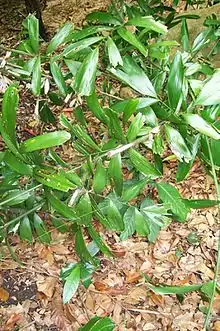Calamus caryotoides
Calamus caryotoides (also Palmijuncus caryotoides), more commonly known as fishtail lawyer cane is a North-East Queensland tropical forest climbing palm with very thin (12 mm [15⁄32 in]) flexible trunks; no crownshaft; small spikes; dark green, glossy, fish-tail shaped leaves reaching up to 15 m (50 ft) high (5 m [16 ft] spread); and very thin hooked flagella.[2]
| Fishtail lawyer cane | |
|---|---|
 | |
| Scientific classification | |
| Kingdom: | Plantae |
| Clade: | Tracheophytes |
| Clade: | Angiosperms |
| Clade: | Monocots |
| Clade: | Commelinids |
| Order: | Arecales |
| Family: | Arecaceae |
| Genus: | Calamus |
| Species: | C. caryotoides |
| Binomial name | |
| Calamus caryotoides | |
It tends to clump and grow up into the shaded understory of Queensland's wet tropical forests, and is a close relative of the more infamous Calamus radicalis (aka Wait-a-While).[2][3]
The Cairns Botanical Gardens records local Yidinydji, Yirrganyydji, Djabuganydji, and Gungganydji use Calamus caryotoides (also known to Yidinydji as Bugul, pronounced BOOK-KOOL) as follows:
The thin flexible trunks of this (and other) climbing palm made ideal building frames, or rope and string when split. The young shoots were eaten to cure headaches.[3]
References
- "Calamus caryotoides". Australian Plant Name Index (APNI), IBIS database. Centre for Plant Biodiversity Research, Australian Government, Canberra. Retrieved 24 July 2013.
- Calamus caryotoides, palm-trees.org. Archived 2009-08-23 at the Wayback Machine Accessed 24 June 2009
- Cairns Botanical Gardens (no date) Aboriginal Plant Use Garden: Cairns Rainforest Region. Cairns Botanical Gardens. Cairns.